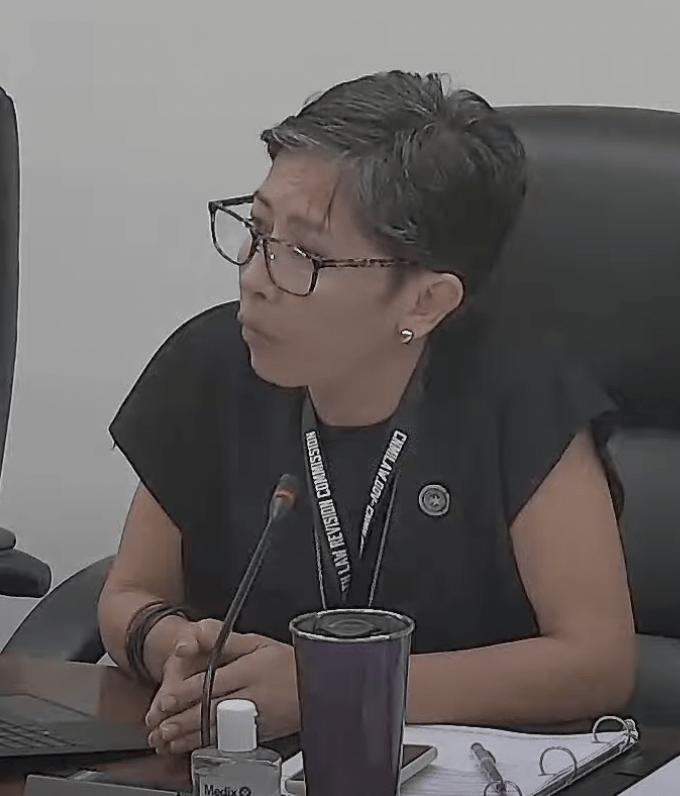[NOTE: The article below comes from the Office of Rep. Marissa Flores, CNMI House of Representatives)

Rep. Marissa Flores filed House Bill 23-22. The Judiciary and Governmental Operations Committee held a hearing on the bill, accepting public comments and written comments from various interested agencies and persons. The JGO Committee adopted a substitute version of the bill, which addressed concerns raised during comments. The committee recommended approval of the substitute bill and prepared a committee report reflecting the substitute bill’s meaning and history.
The investigative subpoena bill now sits in the Senate, assigned to the Judiciary, Government and Law Committee, chaired by Sen. Celina Babauta (D-Saipan). This bill needs the support of the Senate to become law.
The JGL Committee held a hearing and recommended approval of the bill. However, a majority of the Senate refused to vote on the merits of the bill, and instead, returned it to the JGL Committee. The bill now awaits further action. Senate President Edith Deleon Guerrero (D-Saipan) has authority to call up the bill for action at any time. She has exercised that authority several times for her own bills and resolutions.
Meanwhile, local criminal defense lawyer Rob Torres and 15 other lawyers who represent persons charged with crimes, hereinafter known as The Torres 16, have made statements about H.B. 23-22. As those statements are not accurate, the following questions and answers are submitted so that the public can have a reasonable understanding of the issues being raised and the answers that are supported by the law.
What does the bill do?
H.B. 23-22 sets out a procedure for the attorney general to issue subpoenas to obtain documents and statements as part of the normal process in a criminal investigation. This is a very common and accepted procedure for issuance of subpoenas.
Why is the bill needed?
The attorney general has the duty to investigate and prosecute criminal cases. While the Department of Public Safety is the primary investigating agency for criminal matters, the attorney general has the ultimate responsibility for completing investigations and exercising discretion in filing criminal charges.
Every other single prosecutor office in every state and U.S. territory already has a similar procedure for issuing investigative subpoenas. The Commonwealth of the Northern Mariana Islands is the only jurisdiction without such procedure set out in law. Without an investigative subpoena procedure in place, the CNMI attorney general is unable to complete investigations and properly prosecute criminal cases. In short, the gap in the law weakens public safety and threatens to allow public corruption to continue unprosecuted.
A subpoena is a written demand for a person to provide a document or answer questions. Such a demand can be directed, for example, to a bank for deposit records or a hospital for medical records. In addition, the request can be directed to a person to answer questions under oath.
Who issues the investigative subpoena?
The attorney general files an application for the subpoena with the court. The court then issues the subpoena, if the application complies with all the legal requirements set out in law.
What procedures protect a suspect who is the target of a subpoena?
The Torres 16 have loudly proclaimed that the bill is unfair. They have suggested that the subpoenas will be used to violate the rights of a defendant. That is simply untrue. The Torres 16, who are all lawyers, should know better.
If a subpoena is issued to a person who is the target of a criminal investigation, the following protections will exist to make sure all constitutional rights are protected:
- The subpoena must notify the witness in writing whether the witness is a target of a criminal investigation.
- The subpoena must notify the witness in writing of the subject matter of the investigation.
- The subpoena must notify the witness that a court authorized the subpoena.
- The witness is entitled to a 48-hour notice before any questioning takes place.
- The witness can challenge the subpoena by arguing before a court that the application was improper for some appropriate reason.
- Before any questioning, the witness must be warned of the constitutional right to remain silent and the right to an attorney.
- Before questioning begins, the witness may be represented by a lawyer and consult with that lawyer by pausing questioning and seeking counsel.
- The witness may stop any questioning by invoking the constitutional right to remain silent.
- The questions and answers must be recorded.
- If charges are filed, the defendant has a right to a copy of the recording.
- The defendant has the right to argue that the recording is inadmissible if the attorney general did not follow all of the procedures set out to protect the rights of the defendant.
- The attorney general is required to respect the rights of a defendant as part of the responsibilities set out in the American Bar Association lawyer ethical standards.
Does the attorney general support the bill?
The attorney general has provided strong written support for the bill. He has indicated that every other American prosecutor already has such subpoena power. He has explained that the bill would improve the collection of evidence in preparation for deciding whether to file criminal charges. Without subpoena power, the attorney general’s criminal cases are weakened, resulting in ineffective law enforcement, especially in the area of public corruption.
The investigative subpoena bill is a common sense improvement of our criminal justice system. The bill deserves to be heard in the Senate.





